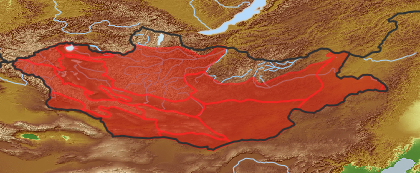| Class: | angiosperms |
| Order: | Zygophyllales |
| Family: | Zygophyllaceae |
| Editor | S. Rilke, June 2014 |
| Name acc. to: | APGII |
| Herbar: | list records    |
| Description: | Leaves opposite, pinnately compound, often binate: reduced to 1 pair of linear leaves, often fleshy. Flowers small. Fruit a capsule, winged or spiny. |
| Tax. Comments: | Excluding Nitrariaceae and Peganaceae, both have been included by Grubov (1982/2001). |
| open map in a new window |  |
| genus: 2 |
| species: 13 |
| Habit (i)general appearance of a plant | |
| Parasite status: (i)Is the plant a half- or full parasite? | no parasite/saprophyte (i)Plant fully autonomous, leaves with chlorophyll
example: Most plants, Ranunculus
|
| Water or terrestrial plant: (i)Where do the plants grow? | terrestrial (i)Plant grows on dry land
example: Orostachys spinosa
|
| Leaf (i)expanded, usually photosynthetic organ of a plant (including phylloclades) | |
| Leaf veination: (i)Arrangement of the main veins of a leaf. | pinnate (i)One main vein, several side veins, sometimes inconspicuous
example: Cicerbita   
|
| Flower (i)reproductive portion of the plant, consisting of sepals, petals, stamens, and pistils | |
| Spur: (i)A hollow, slender, sac-like appendage of the perianth leaves, storing nectar. | no spur (i)Flower without appendage
example: Peganum
|
| Root / shoot below ground (i)plant part below ground (in most cases), including below ground shoots, without leaves | |
| Root type: (i)Organisation of the roots. | allorhizous (i)Plant with a conspicuous tap root, one larger tap root with side roots
example: Dicotyledonae  inherited by order Zygophyllales: allorhizous inherited by order Zygophyllales: allorhizous
|